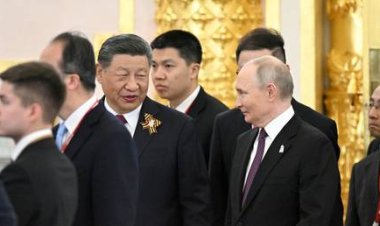Under Strict Police Oversight in Berlin, 'Immortal Regiment' Pays Tribute to Soviet WWII Veterans
Soviet flags and symbols were prohibited at memorials commemorating the defeat of Nazi Germany. On Friday, hundreds gathered in the streets of Berlin to honor those who fought for the Soviet Union during World War II in a civilian march called...

On Friday, hundreds gathered in the streets of Berlin to honor those who fought for the Soviet Union during World War II in a civilian march called the Immortal Regiment. However, participants were not allowed to carry Soviet flags or symbols and could not march as a single group to the city’s primary war memorial.
The Immortal Regiment takes place on May 9 in various cities throughout Russia and beyond, featuring people carrying portraits of relatives who fought against Nazi Germany during the war. The event originated in the Russian city of Tomsk in 2012 and has since gained international traction.
In Berlin, the procession involved members of the Russian community and local residents, weaving through the heart of the German capital before concluding at the Soviet War Memorial in Tiergarten, which honors the thousands of Red Army soldiers buried there.
Marchers wishing to lay flowers at the memorial for the 80th anniversary of Nazi Germany’s defeat were permitted to approach in groups of ten, each accompanied by law enforcement.
At the memorial site, pro-Ukraine activists attempted to disrupt the flower-laying ceremony and required police intervention. Demonstrators chanted “Russia, Russia,” while opposing activists displayed Ukrainian and NATO flags, carrying signs that read “Arm Ukraine.”
Earlier in the week, Berlin city officials announced a ban on Soviet flags and symbols at World War II memorials during the events on May 8–9. This ban also prohibited the public singing of Soviet songs.
Moscow condemned the ban as “degrading” and “discriminatory.” The Russian embassy in Berlin criticized the measures, claiming they infringed on the rights of the descendants of Soviet soldiers, emphasizing that up to 27 million Soviet citizens perished in the battle against Nazism.
In 2023, city authorities prohibited both Russian and Soviet flags during Victory Day events. The subsequent year saw additional restrictions, including a ban on the letters ‘Z’ and ‘V’, linked to the conflict in Ukraine.
Despite these prohibitions, participants in the Immortal Regiment sang ‘Katyusha,’ a beloved wartime folk song that embodies themes of hope, sacrifice, and the yearning of those left behind on the home front.
Navid Kalantari for TROIB News












